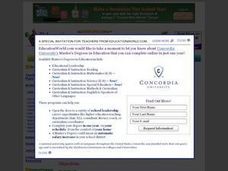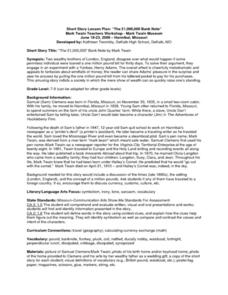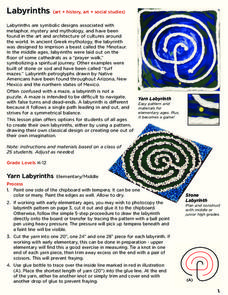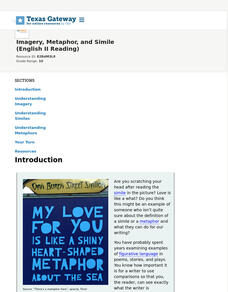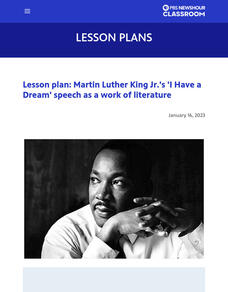Curated OER
Amelia Earhart
Your class can learn about Amelia Earhart and practice important comprehension skills here. Learners answer questions about cause and effect, compare texts, and discuss similes and metaphors after reading Amelia Earhart: Free in the...
Curated OER
Borrowing Narrative Skills from Mr. Fletcher: Using a "Prompts in Reverse" Technique to Inspire Your Writers
Help your class find their writing voices with this lesson plan which uses the work of Ralph Fletcher to guide a "Prompt in Reverse" activity. Using the chapter "First Pen" from Fletcher's Marshfield Dreams, learners decipher what they...
Curated OER
Circle the Simile
Figurative language is a welcome addition to creative writing. Clearly describe similes with this worksheet. For each of 10 example sentences, learners have to identify what is being compared. An answer key is provided with this great...
Curated OER
Matthew Henson
Discuss the work of Matthew Henson, an African American who traveled to the North Pole with Robert Peary. After reading the story "Matthew Henson" by Maryann N. Weidt, learners answer questions by drawing inferences and conclusions,...
Curated OER
Poetry Shopping Spree
Scholars demonstrate the ability to evaluate authors' use of literary elements such as metaphor, simile, personification, imagery, and onomatopoeia. They are provided with a checklist and must shop for poems that contain the poetry terms...
Curated OER
Hot, Hot, Hot, Cold
Learners dance the image of falling snow. They move, swing, fall, and rise to music working to depict snow falling, the sun, and high/low movements. This is a well-thought out lesson plan that aids them in seeing movement as a form of...
Curated OER
Mastering the Mighty Melville
“Bartleby the Scrivner” as an existential forerunner to The Office? Dense and often dark, Herman Melville’s stories abound with Biblical allusions and complex symbols. If you are considering using Melville’s novels or short stories with...
Curated OER
"The 1,000,000 Pound Bank Note" by Mark Twain
Compare real events from Mark Twain's life to events in the story. Middle school readers identify point-of-view, its purpose, and its reliability by citing two examples. They describe the tone of the story using four examples and...
Curated OER
Dear Diary
Work on narrative writing with this lesson plan, in which middle schoolers analyze the characters from a selected piece of literature and write narrative diary pieces as the character. They work to understand the point of view of the...
Curated OER
Language Arts: Telling a Painting's Story
Use art museum paintings as inspiration for your class's creative writing works. Observing the paintings closely, middle and high schoolers list details and write descriptions. Their completed stories are displayed on bulletin boards...
Curated OER
Story Telling through Photography
Use this writing and photography lesson plan in your descriptive writing unit. Elementary and middle schoolers write and create a story line incorporating photos from Inspiration or their own personal photos. They experiment with...
Curated OER
Labyrinths
Whether studying metaphors or Greek mythology, this labyrinth project is a fantastic lesson plan to add to your unit. It includes two versions of the labyrinth; making it with yarn or stone. If your materials are limited, you can even...
Curated OER
English Skills Worksheet (6.203)
In this multiple English activities worksheet, learners complete a variety of assignments: write three onomatopoeia sentences, add ten endings to ten words, give the root words to eight words, play two rounds of word chess, find the...
Curated OER
Similes and Metaphors
This fantastic presentation on similes and metaphors would be ideal for blossoming writers. Learners receive excellent instruction on these terms and are given a meaningful activity to do in their workbooks at the end of the PowerPoint....
Core Knowledge Foundation
Unit 3: Strange Case of Dr. Jekyll and Mr. Hyde by Robert Louis Stevenson Teacher Guide
The Core Knowledge Foundation offers this teacher guide to Robert Louis Stevenson's gothic novel about the duality of humankind. The 128-page guide includes a unit introduction, unit calendar, nine scripted lesson plans, assessments with...
Curated OER
Ballad
Young balladeers analyze examples of ballads and generate a list of common traits (story, quatrains, rhyme schemes, refrains, etc.), then identify these traits in Robert W. Service's "The Cremation of Sam McGee" and a ballad written by...
Curated OER
Poetic Devices
Introduce middle schoolers to poetic devices with a lesson that asks them to find examples of alliteration, anaphora, onomatopoeia, metaphors, similes, and personification in various poems. Young scholars craft examples of these poetic...
Curated OER
Revision
Young poets learn the value of using a thesaurus when crafting and revising poems. They examine poems rich in figurative language and then a revised version with the figurative language removed. To demonstrate what they have learned,...
Texas Education Agency (TEA)
Simile and Metaphor (English III Reading)
The key idea in this interactive exercise designed for high schoolers is that figurative language, especially similes, and metaphors, add layers of meaning to a text. Users examine examples from speeches, ads, movie dialogue, and poems,...
Texas Education Agency (TEA)
Paradox (English III Reading)
Pairs of contradictory words introduce learners to paradoxes, the literary device writers use to get readers thinking deeply about their messages. An interactive lesson uses poems by Emily Dickinson and Wilfred Owen and excerpts from the...
Texas Education Agency (TEA)
Imagery, Metaphor, and Simile (English II Reading)
The sixth interactive in this series introduces learners to the power of figurative language. After studying examples of similes and metaphors, readers examine how such comparisons help them see through a writer's eyes. Interactive...
Texas Education Agency (TEA)
Syntax (English II Reading)
Lesson five in the series focuses on syntax and the elements that make sentences enjoyable. Learners practice building different clauses and phrases and using figures of speech and rhetorical and literary devices.
Academy of American Poets
Incredible Bridges: “Cotton Candy” by Edward Hirsch
Read it, hear it, see it, do it! Young poets experience Edward Hirsch's memory poem, "Cotton Candy," by first closely reading the poem silently, then aloud, watching a video of the poet reading it, and crafting their memory poem of an...
PBS
Dr. Martin Luther King Jr.’s ‘I Have a Dream’ Speech as a Work of Literature
To appreciate the oratory of Dr. Martin Luther King Jr.'s "I Have a Dream" speech, scholars examine the rhetorical devices and influences that make the speech so famous. They examine background information, conduct a close reading of the...






